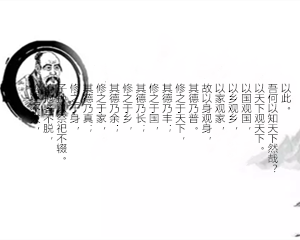(单词翻译:单击)
《道德经》,春秋时期老子(李耳)的哲学作品,又称《道德真经》、《老子》、《五千言》、《老子五千文》,是中国古代先秦诸子分家前的一部著作,是道家哲学思想的重要来源。道德经分上下两篇,原文上篇《德经》、下篇《道经》,不分章,后改为《道经》37章在前,第38章之后为《德经》,并分为81章。《道德经》文本以哲学意义之“道德”为纲宗,论述修身、治国、用兵、养生之道,而多以政治为旨归,乃所谓“内圣外王”之学,文意深奥,包涵广博,被誉为万经之王。《道德经》是中国历史上最伟大的名著之一,对传统哲学、科学、政治、宗教等产生了深刻影响。据联合国教科文组织统计,《道德经》是除了《圣经》以外被译成外国文字发布量最多的文化名著。
译文:善于为自身制定合乎的道德规范的人,是坚决不会动摇;善于秉持自己所认识到的道德准则而行事的人,是不会气馁,丧失自信。如果子孙能够遵循、守持这个道理,那么祖祖孙孙就不会断绝。把这个道理付诸于自身,他的德性就会是真实纯正的;把这个道理付诸于自家,他的德性就会是丰盈有余的;把这个道理付诸于自乡,他的德性就会受到尊崇;把这个道理付诸于自邦,他的德性就会丰盛硕大;把这个道理付诸于天下,他的德性就会无限普及。所以,用自身的修身之道来观察别身;以自家察看观照别家;以自乡察看观照别乡;以平天下之道察看观照天下。我怎么会知道天下的情况之所以如此呢?就是因为我用了以上的方法和道理。

《道德经》(第五十四章)
善建不拔,
善抱者不脱,
子孙以祭祀不辍。
修之于身,
其德乃真;
修之于家,
其德乃余;
修之于乡,
其德乃长;
修之于国,
其德乃丰;
修之于天下,
其德乃普。
故以身观身,
以家观家,
以乡观乡,
以国观国,
以天下观天下。
吾何以知天下然哉?
以此。
Chapter 54
What is firmly established cannot be uprooted;
What is tightly embraced cannot slip away.
Thus sacrificial offerings made by sons and grandsons will never end.
Cultivated in the person, integrity is true.
Cultivated in the family, integrity is ample.
Cultivated in the village, integrity lasts long.
Cultivated in the state, integrity is abundant.
Cultivated everywhere under heaven, integrity is vast.
Observe other persons through your own person.
Observe other families through your own family.
Observe other villages through your own village.
Observe other states through your own state.
Observe all under heaven through all under heaven.
How do I know the nature of all under heaven?
Through this.
更多精品翻译素材,敬请关注可可英语。


